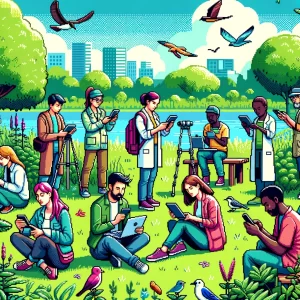
The Future of Science Funding: Will Innovation Survive the Shift?
America has long been a global leader in science and innovation, but the upcoming administration could reshape how we fund and support scientific research. The policies outlined in the 2025 Mandate for Leadership signal a dramatic shift in the priorities for federal science funding. For researchers, students, and even the general public, these changes could ripple through every aspect of daily life, from medical breakthroughs to technological advancements.
Here’s why this matters—and why curiosity, wonder, and a shared vision for discovery must guide us forward.
Shifting Focus: Science Meets Ideology
Imagine a world where funding for scientific research is no longer driven by pressing health or environmental concerns but by political priorities. The 2025 Mandate outlines plans to redirect funding from areas like climate science and public health toward projects aligned with a conservative agenda. This could mean reduced support for renewable energy research, fewer grants for reproductive health studies, and limited resources for addressing social determinants of health.
Think of science as a garden. Funding is the water and sunlight that helps ideas grow. Now imagine someone stepping in to cut off water to certain plants while others flourish. Over time, this changes the entire landscape. The proposals in the Mandate risk creating an uneven field where some areas of research thrive while others wither, leaving critical challenges unaddressed.
Fewer Resources for Collaboration
Scientific breakthroughs rarely happen in isolation. They are born from collaboration, often with federal funding providing the glue that connects researchers across universities, government agencies, and private industry. The 2025 Mandate’s emphasis on dismantling the administrative state and reducing federal spending could weaken these bonds. Programs that fund collaborative research—like those addressing pandemics or developing new clean energy technologies—could face steep cuts.
Imagine if Jonas Salk had to fund his polio vaccine research without federal grants. Would we have eradicated polio as quickly? Without reliable funding streams, many projects that could save lives or transform industries might never leave the drawing board.
The Human Cost of Cutting Edge
Science isn’t just about labs and data—it’s about people. From cancer patients hoping for new treatments to farmers relying on weather forecasts informed by climate research, the impact of science funding reaches everyone. Proposed budget cuts risk stalling progress on projects that could solve real-world problems.
For instance, consider a researcher studying Alzheimer’s disease. With funding, they could develop a treatment that delays the disease’s onset. Without it, their work could be shelved indefinitely. This isn’t just about abstract numbers on a spreadsheet; it’s about families, futures, and the hope that tomorrow can be better than today.
Inspiration at Risk: Losing the Next Generation
Beyond immediate impacts, reduced science funding could dampen the aspirations of future innovators. If young students see fewer opportunities to pursue careers in research, the pipeline of talent may dry up. Programs that encourage diversity in STEM fields, often federally funded, might disappear, making it harder to foster a scientific community that represents all Americans.
Imagine a curious young mind, eager to explore space or cure diseases, discouraged because scholarships and grants are no longer available. What discoveries might we lose if the next generation feels science isn’t valued?
Join the Conversation
Science has the power to transform lives, but it relies on our collective support. With these potential changes to funding on the horizon, it’s time to ask ourselves:
- How can we ensure that critical areas of research continue to receive the funding they need to benefit society?
- What role should citizens play in shaping policies that influence the future of science and innovation?
Share your thoughts in the comments or join the discussion on social media using #FundScience and #ScienceMatters. Let’s keep curiosity alive and innovation thriving.
Join the Science Adventure:
Stay updated with the latest discoveries in science! Our weekly newsletter is perfect for teachers and science enthusiasts. Get the newest research, major breakthroughs, and fascinating stories delivered to your inbox for free. Enhance your teaching and learning. Subscribe today! If you liked this blog, please share it! Your referrals help This Week in Science reach new readers.



